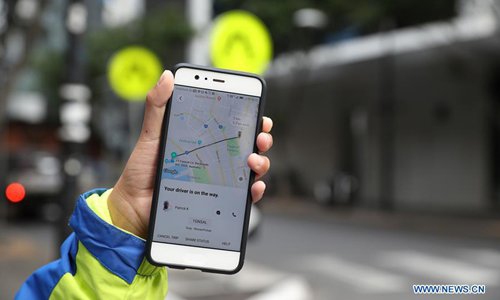New services to care for the elderly become a trend as China's ageing population grows
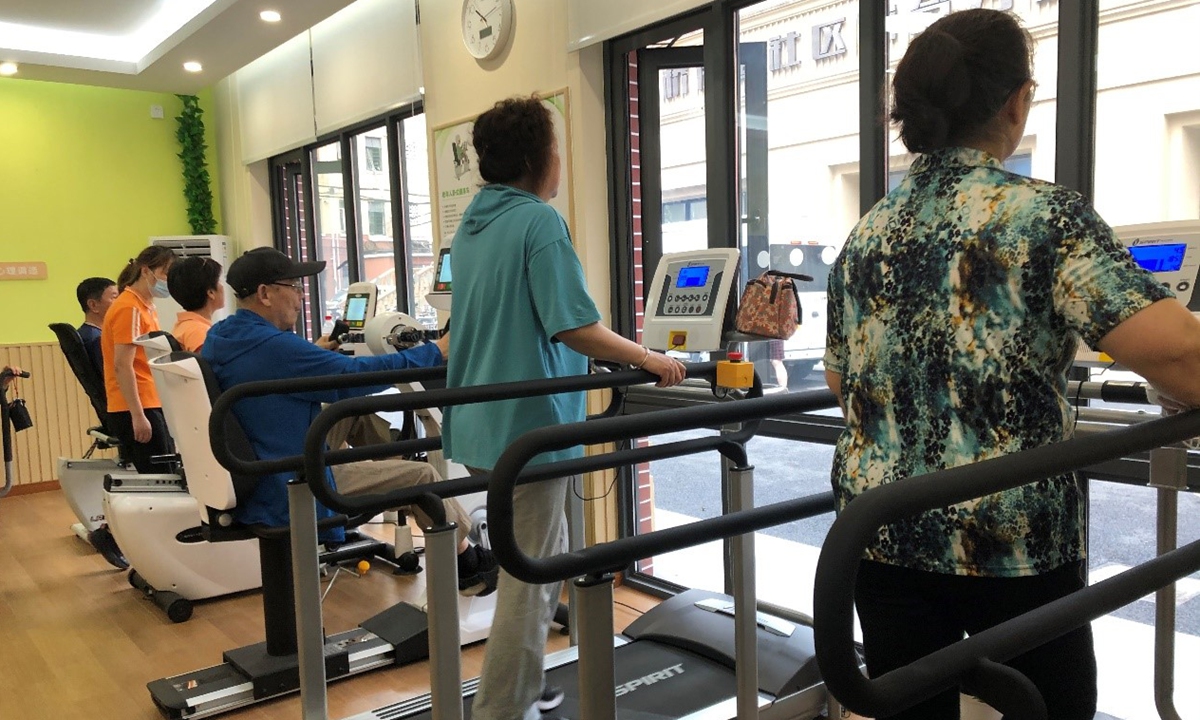
Senior citizens exercise in a fitness club for elder residents only, in Hongqiao subdistrict, Changning, Shanghai. Photo: Chen Shasha/GT
As the ageing population in China grows, elderly-friendly designs and services now have become a popular trend in elder care services centers, public facilities, and individual households to ensure that the elderly are being well cared for and enjoy efficient and convenient services.
Chen, a resident in Hongqiao, a subdistrict of Changning in Shanghai, visits the fitness club at her community twice every day to exercise. "The facilities in the club are all digital but the designs are user friendly and there are staff here to help us. That's why I would always feel at ease when working out here," Chen told the Global Times, adding that the fitness club is only for those aged between 55 and 70.
Part of the Hongqiao Comprehensive Elderly Care Service Center in the community, the fitness club is designed based on the needs and physical characteristics of the elderly, Yu Chenjie, a staff of the fitness club, Newbody Lohas, told the Global Times. For instance, the treadmill is set to a slower speed and has longer handrails on both sides for the elderly to hold on to, and the exercise bike has a backrest to avoid damage to the waist.
Besides, there is a monitoring system that collects and displays heart rate and exercise data in real time. If something unusual happens, the monitor will issue a warning, Yu said.
In general, Shanghai's efforts to improve elder care range in different forms, including helping the elderly renovate their homes with easy-to-operate and protective appliances and installing elevators in old residential buildings to make it easier for them to get around.
Some communities in Shanghai have brought elderly care service to the cloud to help the elders have access to in-home care and protection with high technology. With smart devices like health information collector, calling unit, sensors, and alarms installed at the user's home, a care giver can use an online platform to check on the health and activity, and provide instant services in an emergency situation .
The calling unit, for instance, will let the user get in contact with family or support staff by simply pressing one button, according to Wang Wei, a staff personal support worker in the Hongqiao subdistrict.
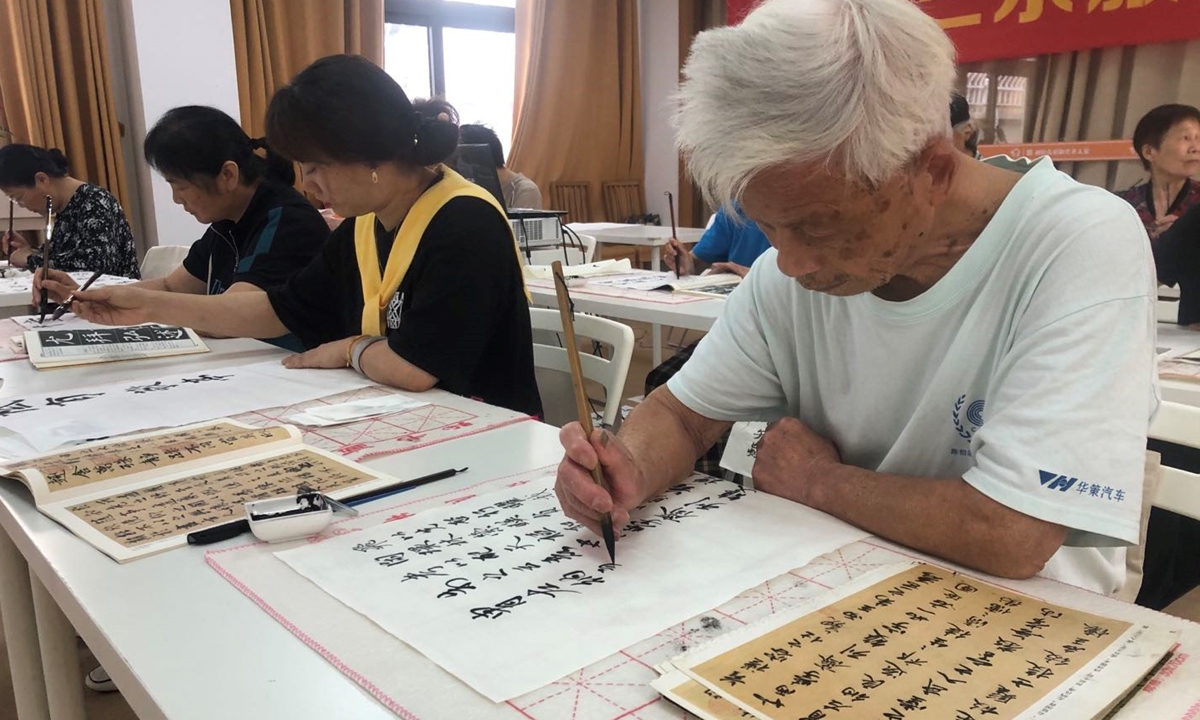
Residents in Hemu community in Hangzhou, East China’s Zhejiang Province, practice Chinese calligraphy in a class designed for senior people. Photo: Chen Shasha/GT
Hangzhou, in East China's Zhejiang Province, is trying to ensure its elderly residents to enjoy the same efficiency in public services as younger generations do.
Hangzhou's civic center provides offline government services with self-service machines that are equipped with a video calling function.
Users with limited computer literacy can make a video call directly on the machine to a service staff who will process the request remotely and provide a response within minutes.
The local government is providing barrier-free intelligent services for the elderly, the disabled and other vulnerable groups. This has allowed equal access to convenient public services , Chang Jian, Director of the Human Rights Study Center at Nankai University, told the Global Times.
Elder care at the doorstep
Demand of care for the elderly has been increasing in China as its population ages rapidly. The latest national census released earlier this month shows that there are now 260 million people aged 60 or above in China, accounting for 18.70 percent of the population.
To make care for the elderly more accessible and friendly, some residential communities are bringing the services to the neighborhood.
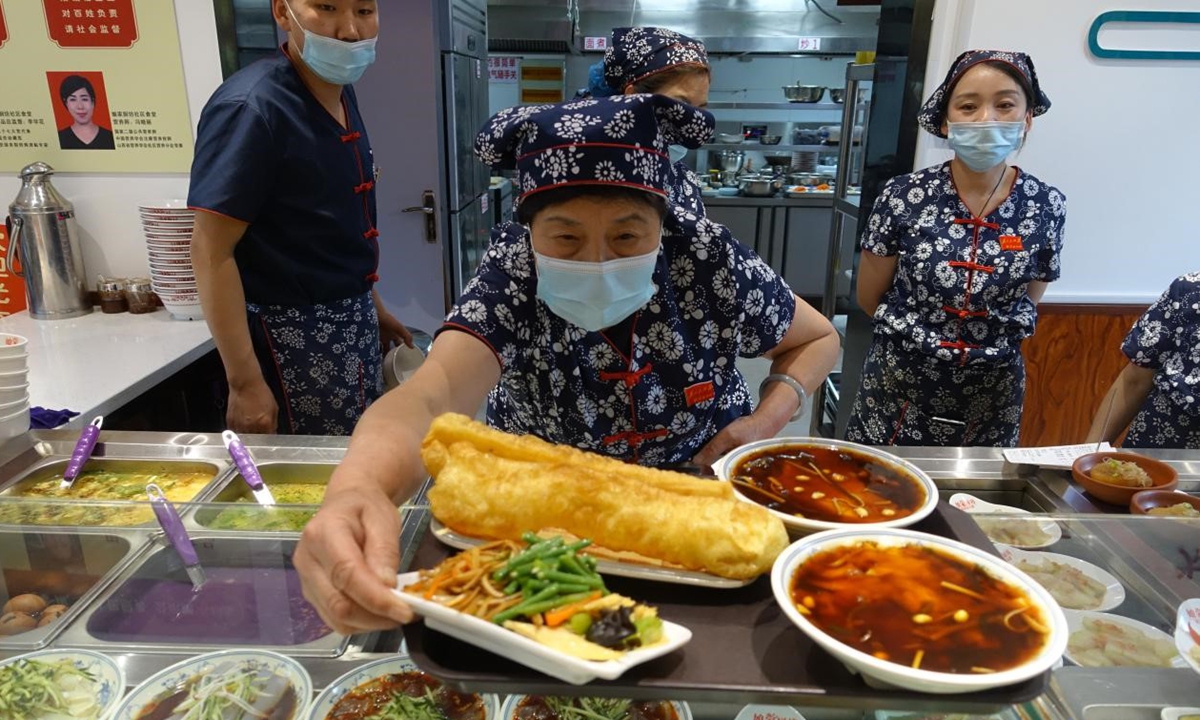
The elderly friendly canteen in Yifenyuan Community in Taiyuan, North China's Shanxi Province. Photo: Lin Xiaoyi/GT
In March, an elderly friendly canteen in Yifenyuan Community in Taiyuan, North China's Shanxi Province, reopened after the city recovered from the pandemic. The canteen, with relatively low prices for meals , has hired special dietitians to research and develop nutritious menus suitable for the elderly with low sodium, oil and sugar.
"Food is one of the problems that most concern our elderly people. As we age, our mobility deteriorates and our children are busy with work. My wife and I eat at the community cafeteria every day where my family and I feel at ease," 70 year-old Ge Xinwen told the Global Times. A resident of Yifenyuan Community for more than 20 years, he has witnessed the improvement of community elderly care services.
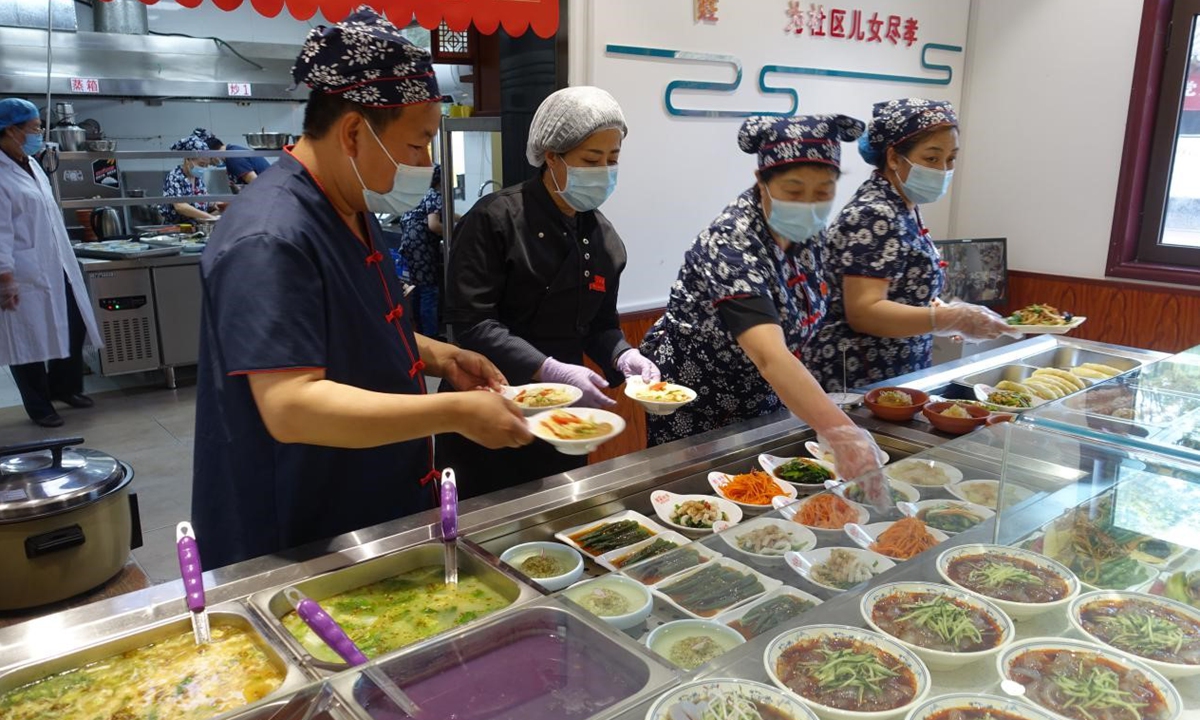
The elderly friendly canteen in Yifenyuan Community in Taiyuan, North China's Shanxi Province. Photo: Lin Xiaoyi/GT
According to Taiyuan Civil Affairs Bureau, the city will build 140 community canteens in 2021, and 500 community canteens by the end of 2025.
Some communities like Hongqiao or Hemu community, in Gongshu district in Hangzhou, are trying something new: deploying multiple elderly care facilities and services in the neighborhood. Different from the traditional nursing residences that are usually away from home, this approach has made elderly care services more acceptable among local residents.
For instance, at Hemu community, where 35 percent of the residents are aged 60 and above, dining, nursing, basic medical services, rehabilitation facilities, entertainment, daily service, are distributed throughout the residential compound. Residents can easily get to a service center within a few minutes.
"We call it a street-block elderly care or a nursing home without walls. We have a variety of activities and services including eating, living, medical service, nursing and care, and entertainment to meet the needs of elder residents and ease their loneliness," Rao Yongjiu,Party chief of the Hemu subdistrict, told the Global Times.
In Xiaoyi, Shanxi Province, the Wutong New District invested 270 million yuan ($40.59 million) to build an apartment building to provide free housing for more than 1,200 elderly residents and a centralized care service for 26 childless and ill elderly people.
The apartments are equipped with elderly care rooms and special medical teams, from urban and central hospitals, coordinate with the community to provide services. Special remote video consultation rooms have also been set up for live online meetings to respond to any medical problem.
At present, the country is actively exploring more advanced and scalable elderly care services to provide convenient and complete care. It is gratifying to see such momentum but it is worth noting that a sustainable funding is needed to make sure basic elder care services cover each person, observers and experts noted.
Some communities, like Hongqiao and Hemu, have invited a third party, including social organizations and enterprises, to engage in keeping the service running. Under this mechanism, local authorities provide space and infrastructure, while a third party investor provides free or low-profit services, the Global Times learned.

